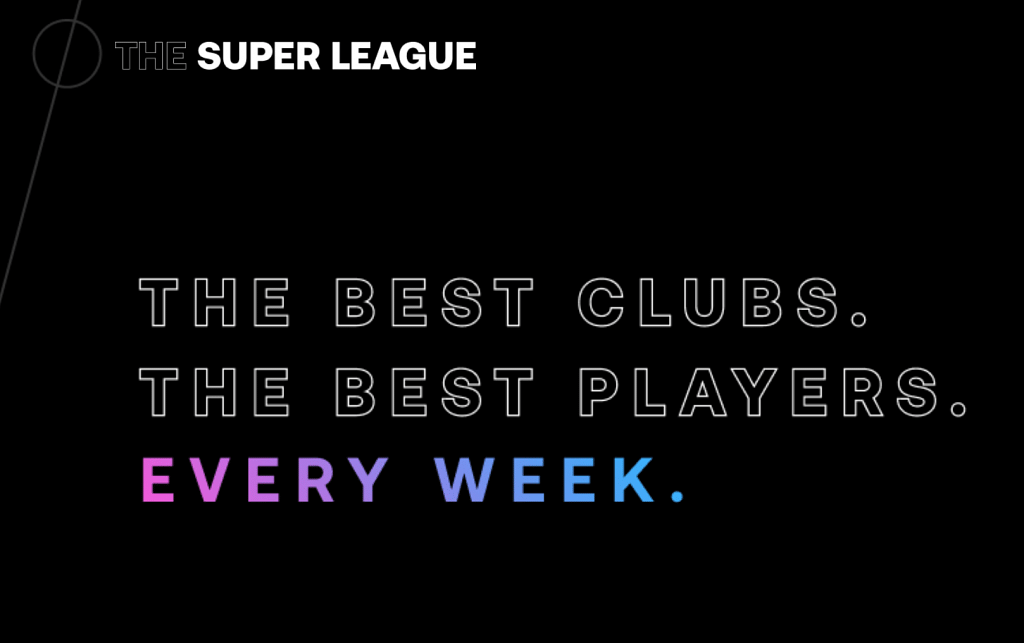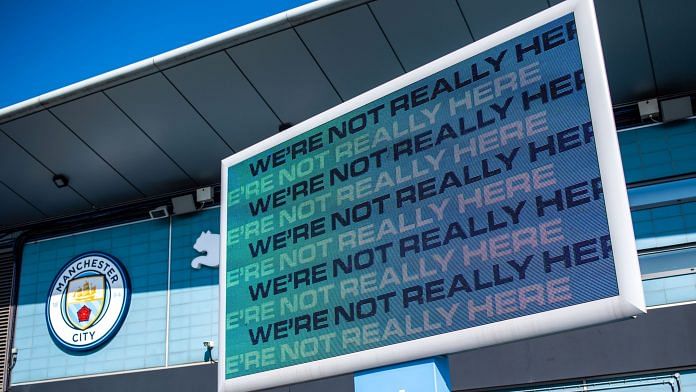New Delhi: On 18 April, 12 of Europe’s biggest football clubs officially confirmed their plans to form a new, breakaway competition known as the Super League. This threatens to shake up European football as we know it.
The financial incentives for the league’s participants are immense, but the 12 clubs’ announcement was lambasted by many major stakeholders that make up European football, be it governing bodies, former players, coaches, fans or even the UK Prime Minister Boris Johnson.
Here is everything you need to know about the league and why it is facing so much opposition.
What is Super League & who are the 12 clubs slated to participate?
The 12 clubs’ joint press release describes the Super League as “a new mid-week competition” that is “governed by its Founding Clubs”. As such, the league is being marketed as the best clubs with the best players playing each other every week — beginning in August with the round-robin phase, followed by staggered knockout rounds and ending with the final match in May.

The founding members in question include six clubs from the English Premier League (Arsenal, Chelsea, Liverpool, Manchester United, Manchester City and Tottenham Hotspur), three clubs from Spain’s La Liga (Atletico Madrid, Real Madrid and Barcelona) and three clubs from Italy’s Serie A (Juventus, Internazionale and Milan).
Although there are currently 12 founding members, the league itself is intended to consist of 20 clubs with 15 founding members and “a qualifying mechanism for a further five teams to qualify annually based on achievements in the prior season”, according to the press release.
It adds that the format and schedule of the league as “midweek fixtures with all participating clubs continuing to compete in their respective national leagues, preserving the traditional domestic match calendar which remains at the heart of the club game”.
The three chief representatives of the league were also revealed — Real Madrid president Florentino Perez takes charge as the League’s first president, Manchester United co-chairman Joel Glazer and Juventus chairman Andrea Agnelli are the League’s two vice-chairmen.
Also read: 12 top football clubs confirm plans to launch new European Super League
How Europe’s soccer officials and fans have reacted
Given its continental nature and scheduling in the middle of the week, the Super League runs in clear competition with the UEFA Champions League, which has been the highest calibre European club football tournament since its establishment as the European Cup in the 1950s.
Facing the threat of loss of value and relevance by the Super League, UEFA has, unsurprisingly, been among the biggest critics of the breakaway tournament.
Aleksander Čeferin, the governing body’s president is reported to have said that any players “that will play in the Super League” will be “banned” from international-level competitions for which UEFA holds qualifying tournaments, i.e. the FIFA World Cup and the UEFA European Championships.
The governing body is also considering the expulsion of Super League teams that are still involved in the ongoing seasons of the Champions League and the Europa League. The players also face a ban from playing for their national teams, according to Čeferin.
UEFA’s Alexander Ceferin confirms: “The players that will play in the Super League will be banned from playing in the World Cup and Euros. Ceferin. They will not be allowed play for their national teams”. ??? #SuperLeague
— Fabrizio Romano (@FabrizioRomano) April 19, 2021
NEW: A further UEFA mtg will now take place within the next 24 hours. There will be a motion to formally expel Arsenal and Manchester United from the #UEL and Man City, Chelsea and Real Madrid from the #UCL – meeting will also decide how the competitions will be completed. https://t.co/TBe5lgXR6y
— Chris Williams (@Chris78Williams) April 19, 2021
There is also a general fear among the Super League’s detractors, players and fans alike, that the league will not only lead to declining revenue and subsequent shutdown of smaller teams outside of the league, but also erode historic traditional football fan culture across Western Europe.
These detractors include former Manchester City defender Micah Richards, former Manchester United defender Gary Neville, Zenit St. Petersburg and former Liverpool defender Dejan Lovren, and former Arsenal & Real Madrid midfielder Mesut Ozil.
Several official supporters’ groups of the 12 founding clubs have echoed these sentiments. The Tottenham Hotspur Supporters’ Trust, for instance, have branded the league as “a concept driven by avarice and self-interest at the expense of the intrinsic values of the game we hold so dear”.
Even the United Kingdom’s Prime Minister Boris Johnson has got involved. In a tweet Monday, Johnson said a European Super League would “strike at the heart” of the English football pyramid. “The clubs involved must answer to their fans and the wider footballing community before taking any further steps,” he added.
Plans for a European Super League would be very damaging for football and we support football authorities in taking action.
They would strike at the heart of the domestic game, and will concern fans across the country. (1/2)
— Boris Johnson (@BorisJohnson) April 18, 2021
The Super League concept
The concept of a centralised, single entity league consisting of Europe’s richest clubs is far from new. The first reports on a European Super League date back to 1998, when several of the same clubs as the current founding members were reported by The Independent as abandoning their plans for a rival league after accepting the Union of European Football Associations’ proposals to “modify” its flagship competition — the Champions League.
Subsequent rumours and reported attempts made to form the breakaway Super League were viewed as similar to the 1998 case — i.e. an attempt by the richest clubs to leverage UEFA into gaining greater revenue shares and financial control within the Champions League.
However, the biggest reason that the Super League has been officially established this time appears to be money: the $4.2 billion investment from the American bank JP Morgan Chase. As part of this investment, the 12 founding clubs have, reportedly, been promised a $240 million-$360 million “welcome bonus” by the bank.
In their press release, the 12 founding clubs also said the Covid-19 pandemic “accelerated the instability in the existing European football economic model”, thereby hastening the need for “a strategic vision and a sustainable commercial approach” to increase the value of European football.
The clubs also cite “extensive dialogue” that they partook in with “football stakeholders regarding the future format of European competitions”. This dialogue in particular references the proposed Swiss Model of the UEFA Champions League, which would have expanded the round-robin format of the competition from 32 teams to 36 and significantly restructured it.
What could happen now?
UK PM Boris Johnson has pledged that his government would do everything in its power to block the league, even as Culture Secretary Oliver Dowden announced a fan-led review into the wider governance of football in England. But neither has given further details as to how to achieve this goal.
It remains to be seen if UEFA or the UK government can make its threats against the 12 football clubs stick, or if the latter have successfully put in place a rebel league in a legally ironclad fashion. Regardless, the mere announcement of the Super League has already created enough ripple effects across the wildly popular and lucrative industry of European football.
Also read: Football, the beautiful game, has turned ugly in China



